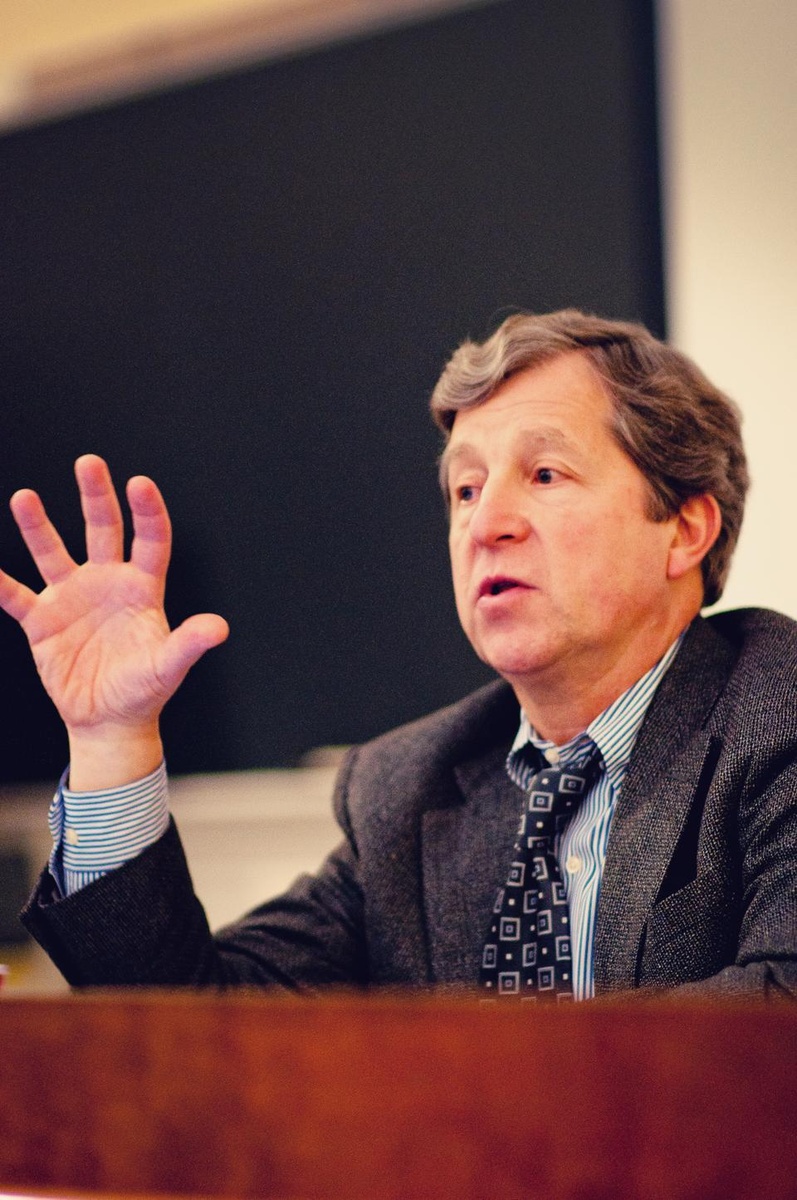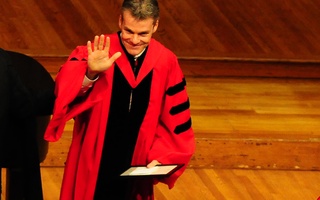
Charles A. Nelson, Professor of Pediatrics at Harvard Medical School, discusses his research on Romanian orphans in Harvard Hall yesterday.
Lack of stimulation in Romanian orphanages stunts brain development in children, Harvard Medical School Professor of Pediatrics Charles A. Nelson said at a Harvard China Care event Tuesday evening.
At the request of the Romanian government, Nelson studied the influence of childhood experience and early psycho-social deprivation on the brain in Romanian orphanages.
“Romania had a particularly egregious history,” Nelson said.
Communist policies have left an overwhelming population of abandoned children to state institutions.
Children in overcrowded orphanages often struggle with a stifling, highly-regimented daily routine, Nelson said.
These environments often cause social interaction and attachment problems, autism, and stunted growth.
Without stimulating experience, children develop “brain deprivation” as a result of social neglect.
Nelson’s study found that children suffering from brain deprivation appear physically stunted. The body appears to save essential growth hormones for brain development, he said.
Children in orphanages generally have smaller brains than other children. They also consistently display radically lower IQs than average children. Nelson hypothesized that fewer brain cells might account for lowered brain activity.
Research also showed that children who were moved to foster homes before the age of two were more likely to recover from the detrimental effects of living in an orphanage. But children moved to a foster home after the age of two showed little amelioration.
These results suggest that the impact of an environment on development varies over time, Nelson said. A child’s development occurs during “sensitive” or “critical” periods of growth.
According to the study, girls do not suffer in institutions as much as boys. Girls also benefit more when they are placed in foster home.
Romanian officials originally hoped that scientific evidence would influence the government to change orphanage policies, but Nelson said he is hesitant to promote policy changes.
“We can’t just waltz into the country and think that we know best,” Nelson said.
Although the location of Nelson’s research differs from China Care’s traditional focus in Asia, event organizers said his work is still relevant.
“His research is incredibly applicable to China Care’s work,” said Rena Mei ’13, China Care Medical Committee co-coordinator and co-coordinator of the event.
“I hope people not only learn more about the medical conditions in orphanages, but they’ll also be motivated to do something about it,” she added.
Read more in News
Cambridge Voters Re-Elect 8 of 9 City Council MembersRecommended Articles
-
The Glod-Slinging BeginsIn the wake of the movie “Borat,” two cases are being brought against four companies involved in its making for
-
Consul: EU Entry Threatens CultureAs Romania prepares to join the European Union (EU) in January 2007, a Romanian official warned that the accession would
-
Romanian HolidayLike every little girl, I dreamed of vacationing in Eastern Europe. It wasn’t just the glamour—I wanted to go to
-
Harvard Puts Romanian Timberland Associated with Bribery Case Up for SaleThe documents advertising the sale were posted in Romanian provinces two days after Dragos Lipan Secu, a former contractor for a University subsidiary, was arrested on charges of bribery and money laundering.
-
 Harvard's Controversial Romanian Forest Sold to Ikea Group
Harvard's Controversial Romanian Forest Sold to Ikea Group













